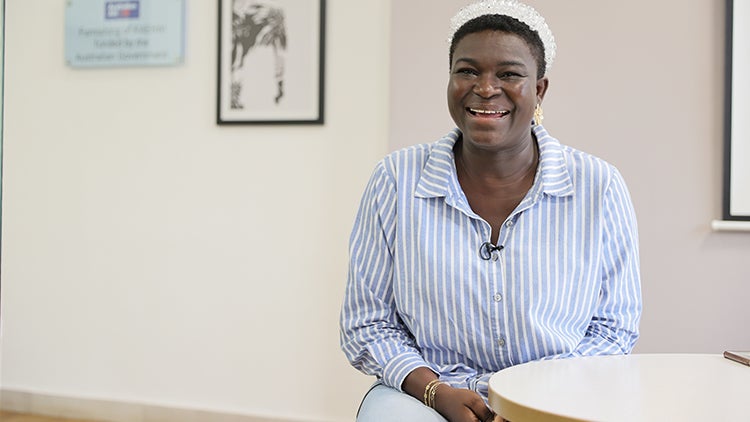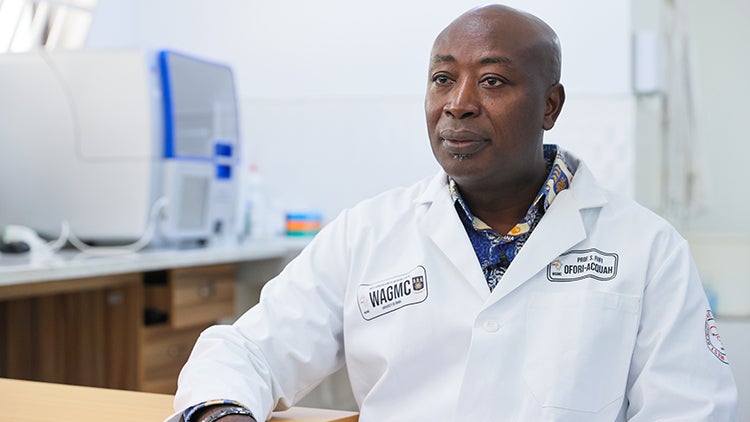 Professor Solomon Ofori-Acquah pioneers the genome program
Professor Solomon Ofori-Acquah pioneers the genome program
There is something upliftingly glorious about homegrown solutions. They fill us with a sense of pride, a can-do spirit that makes us feel invincible. They give us hope for the future, knowing that if we could find a solution to one problem, with a bit of elbow greasing, we could solve the next ten. I was imbued with this spirit when I visited two African Centers of Excellence in Accra, Ghana, tackling two big challenges in the lives of millions of African people: food insecurity and the sickle cell anemia.
Homegrown food security agents
Have you ever heard of the West Africa Center for Crop Improvement (WACCI)? Neither had I. But this African higher education Center of Excellence (ACE) – a regional program supported by the World Bank – might hold the key to food security in West Africa and beyond despite the devastating effects of climate change. In 2022 alone, a further 140 million Africans were pushed into food insecurity due to climate events and insecurity, according to the World Bank. In a publication by the Food and Agriculture Organization (FAO) they recorded the prevalence of moderate or severe food insecurity in Sub-Saharan Africa at 64.2% in 2021. Not only has the Center produced and improved, drought-resistant varieties of seeds such as corn and rice, it is also breeding the next generation of Africa’s plant breeders and crop geneticists. I met inspirational characters such as Sandra Esi Odorkor, who left the United States to return to Ghana to contribute to the nation’s food security through her passion, tomato breeding. “I do this for my daughter, so she can know that women can excel in science but also be proud of her mother’s contribution to the food on her plate,” Sandra said.

I also had the chance to meet Amos Rutherford Azinu, an almost swashbuckling character who works with WACCI to supply improved seeds to commercial and smallholder farmers. Amos previously worked with WACCI as a field technician. Still, after realizing the gap in the food value chain, he struck out by himself to establish the Legacy Crop Improvement Center in 2015. In his first year, his company produced half a ton of corn seeds that did not sell. But today, Amos serves 1,124 farmers in Ghana and three seed companies and distributors in Ghana, Mali, Togo, and Burkina Faso, to whom he supplies WACCI seed varieties.

Sickle cell anemia and so much more
I must admit, I was 31 years old (I’m 32 now) when I discovered that our genetic makeup plays a role in how we respond to medication and other medical therapies. I was also the same age when I discovered that Africa has yet to fully map its genetic makeup as others in the West or East. What does this mean? Not all the medications, vaccines, and therapeutics developed in the West are as effective on Africans. Shocking? What if I told you there is an ACE at the University of Ghana committed to doing just that?
The University established the West African Genetic Medicine Center (WAGMC) in 2019 to tackle sickle cell disease, a prevalent genetic disorder in our part of the world. In Ghana, sickle cell disease affects approximately one in every fifty live births. The Center has expanded its purview beyond sickle cell and now researches other genetic disorders.
The goal of the Center is to train health professionals who understand and factor genetics into medical care, providing holistic medical treatment. It recently received accreditation for its Master of Science (MSc) Genetic Counselling program, a first of its kind in Sub-Saharan Africa, and is in the accreditation process for Master of Philosophy (MPhil) and Doctor of Philosophy (PhD) in Medical Molecular Genetics.
Prof. Solomon Ofori-Acquah put it best, “by pioneering the training of genetic health professionals, WAGMC is helping Africa to overcome a major developmental health challenge in genetic disorders on the continent.”
The solutions we need are all around us
Africa’s solutions are here. The minds we need are on the continent, ready to birth an avalanche of elegant, tailored solutions to the challenges we face in healthcare, food security, governance, and more. What do we need to do? We must invest. How do we sustain the investments? We should support scientific research that will inform and influence policies in key development areas. We must ensure that our leaders and governments show the same faith our great minds have shown in us by not leaving the continent. If we do that, no longer will Africa import solutions. We will develop and export them.



Join the Conversation